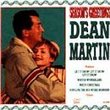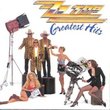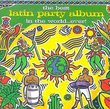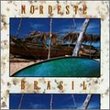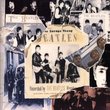| All Artists: Joseph Haydn, Nikolaus Harnoncourt, Cecilia Bartoli, Patricia Petibon, Concentus Musicus Wien, Christoph Prégardien, Markus Schäfer, Scot Wier, Oliver Widmer Title: Haydn - Armida / Bartoli · Petibon · Prégardien · M. Schäfer · Wier · Harnoncourt Members Wishing: 0 Total Copies: 0 Label: Warner Music France Original Release Date: 1/1/2000 Re-Release Date: 11/7/2000 Album Type: Import Genre: Classical Styles: Opera & Classical Vocal, Historical Periods, Classical (c.1770-1830) Number of Discs: 2 SwapaCD Credits: 2 UPC: 685738110827 |
Search - Joseph Haydn, Nikolaus Harnoncourt, Cecilia Bartoli :: Haydn - Armida / Bartoli · Petibon · Prégardien · M. Schäfer · Wier · Harnoncourt
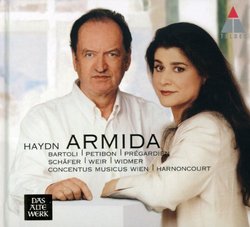 | Joseph Haydn, Nikolaus Harnoncourt, Cecilia Bartoli Haydn - Armida / Bartoli · Petibon · Prégardien · M. Schäfer · Wier · Harnoncourt Genre: Classical
Thanks to his omnivorous curiosity, conductor Nikolaus Harnoncourt has revived an authentic masterpiece. Several opera composers--Lully, Handel, and Gluck--had already availed themselves of the amorous and stormy adventur... more » |
Larger Image |
CD DetailsSynopsis
Amazon.com Thanks to his omnivorous curiosity, conductor Nikolaus Harnoncourt has revived an authentic masterpiece. Several opera composers--Lully, Handel, and Gluck--had already availed themselves of the amorous and stormy adventures of the knight Rinaldo and the enchantress Armida, drawn from Tasso's Jerusalem Liberated. Composed in 1784, Haydn's Armida was his the final opera he wrote for his patron Prince Esterházy, but it was also the composer's debut opera seria. Even so--and just like Mozart--Haydn knew how to free himself from the rigid and monotonous alternation of aria and recitative that customarily governed this genre. Thus the final act, which unfolds in an enchanted forest, offers us a half-hour of nearly uninterrupted music, even prefiguring the romantic shape of things to come in the 19th century. This recording was made from a concert performance in June 2000 in Vienna's sumptuous Musikverein under the blazing baton of Harnoncourt. The cast is impeccable--including Christoph Prégardien and Patricia Petibon and dominated by the stunning Cecilia Bartoli, who can swerve within a few bars from boiling anger to the most overwhelming amorous pleading. --Franck Erikson Similarly Requested CDs
|
CD ReviewsA treasure... Izolda | North Haven, CT United States | 11/26/2000 (5 out of 5 stars) "Haydn's operas became dear to me when I discovered the wonderful, now about 20 years old Philips set of the Eszterhaza cycle recorded by Dorati. By some caprice of fate these marvelous performances never really caught the attention of opera lovers and became known only to Haydn's most ardent devotees. I joined this circle only about a year ago and immediately immersed myself in these utterly delightful works. I never seemed to have enough of them, each listening was bringing new treasures and often the impression of `deja entendu'. Yes, these works were so `Mozartian' (though composed long before Mozart started writing his masterpieces) that I couldn't understand how such great musical achievements could have been deemed as not quite successful. Haydn's operas are marvelously orchestrated, studded with surprising little details which Haydn seemed to produce effortlessly; one has the impression that the composer is not interested in following the beaten musical path, that he teases both the musicians and the listener. Apart from the delightful orchestration, two other features deserve a special mention: magnificent accompanied recitativi, many of them as fine as Donna Elvira's "In quali eccessi" for example and fantastic, elaborate ensembles. Haydn's operas contain a great number of beautiful arias which certainly deserve to be more popular than they are now (for samples I can refer the readers to Anne Sofie von Otter's recital of Gluck's, Haydn's and Mozart's arias on DG Archiv, tracks #7 and 8 and above all #13 for an example of a "Mozartian" aria with a lovely horn obligato). Dorati's cycle is a marvel, really one of the treasures of recorded opera. Conducting, singing and the overall atmosphere are of the highest order. These performances are indeed sheer delight: there is a feeling of genuine joy of music making, something that I find more and more absent in many recordings of our days. It's a pity that the set is no longer in the catalogue (it is, however, still available in Europe) - how long it will take for Philips to reissue these splendid performances at mid-price remains an open question, but it will happen one day, I am sure. In the meantime we have three serious attempts at resuscitating Haydn's operatic output. Just a few years ago Christopher Hogwood (with Cecilia Bartoli) recorded Haydn's last opera "Orfeo ed Euridice", then came "L'isola disabitata" under David Golub and now we have Harnoncourt's "Armida" which may finally, I hope, bring about a real revival of Haydn's operas."Armida" is hailed as the best of Haydn's operatic works and even if I don't totally share this view, I am closer to understanding its popularity now, after having heard Harnoncourt's recording than when I heard it first on the Dorati set. Today, after hours and hours spent with recordings of this great Hungarian conductor, I can say that "Armida" was probably the weakest link in his Eszterhaza cycle. I will go even further and put the blame on Jessye Norman's bland and uncharacteristic Armida. Norman's isn't a kind of voice I find suitable for this repertoire; even if she tries to give her Armida some personal touches, not a single moment in her singing brings us closer to the fact that we are dealing with a terrifying sorceress; she also never quite conveys her heroine's feelings, love and passion for Rinaldo and her great torment. That's a pity, because almost everything else in this recording (save some of the recitativi secci which seem to drag; incidentally - most of the recitativi secci on the Harnoncourt set are abridged, some even substantially. The booklet doesn't explain if these are Haydn's own changes or simply adaptations made by Harnoncourt for the purpose of this concert performance) works very well. Bartoli's Armida is quite a different story, a story that really doesn't need to be talked about but simply listened to - Cecilia is in her element and gives her heroine a real human dimension. Don't bother to follow the printed libretto or brush up your Italian - you don't need to understand a single word to be able to make some sense of what is going on. That's what a great performance is about and this one will leave you under a spell for long, long time. Harnoncourt's "Armida" is a real theater of passion. How far from (or close to) Haydn's intentions or Haydnesque spirit this performance is I don't know and I don't care. All the delights of the score are beautifully rendered by Concentus Musicus, although those who know the Dorati set may be initially shocked by some of Harnoncourt's tempi. They don't bother me, I even find them convincing as they are flexible, not monotonously on the hectic side which has become a bad habit nowadays. Here and there a gentler touch wouldn't hurt, but generally it`s a great performance and great musical theater. Patricia Petibon is an excellent Zelmira, even if she doesn't completely outshine Norma Burrowes on Philips. Christoph Pregardien (Rinaldo) has occasionally some vocal problems, but they are really marginal (it is worth remembering that it's a LIVE recording, though all audience noises and the final applause have been suppressed) - his voice is heroic enough, yet still gives the desirable impression of vulnerability. The remaining three supporting characters, Idreno, Clotarco and Ubaldo are well taken by Oliver Widmer, Marcus Schaefer and Scot Weir respectively, the latter convincingly adding some humor to his hero's portrait.I could go on and on, far beyond these 1000 words given to me here. This release of "Armida" is really a great event for all opera lovers and we can only wish that Harnoncourt will record more of Haydn's unjustly neglected masterpieces in the nearest future. I only hope that the packaging will be a little more user- and CD-friendly!" Period instruments do make a difference Isabella Channel | 12/26/2000 (5 out of 5 stars) "Like almost everyone else, I have treasured for over 20 years the Antal Dorati Haydn opera cycle in Philips. At that time, when Philips was run by smart and competent people, we could expect Haydn recordings with the likes of Jessye Norman, Frederica von Stade, Ileana Cotrubas and Luigi Alva; these days we are damned with Bocelli in La Boheme and the Verdi Requiem. Anyway, even if it took more than 20 years for the next recording of Haydn's Armida to appear, it was worth the long wait. The most important contribution is the use of period instruments which help to clarify the textures and the orchestral balance. The excellent Concentus Musicus Wien has Haydn in its blood and plays superbly for Harnoncourt, who next to Frans Bruggen is probably the finest Haydn conductor ever. Cecilia Bartoli covers herself with glory, singing with total command and understanding her difficult character. Jessye Norman was also superb, and it is obvious that both prima donnas understand what a great opera this is. It is true that Claes H. Ahnsjo was more exciting for Dorati than Pregardien is for Harnoncourt, but then he is singing live a terribly difficult and demanding role. Pregardien is more cautious but very good too. The rest of the cast is excellent, and I can recommend this Armida next to William Christie's Alcina and Antonio Pappano's Manon as the three finest operatic recordings of year 2000." One of the finest recordings of the year Erick | Satellite City | 11/29/2000 (5 out of 5 stars) "I can only congratulate Cecilia Bartoli for choosing this marvelous opera instead of recording another "Barbiere". Smart as she is, she found in Armida a perfect role for her. Christoph Pregardien, a most eloquent Lieder and oratorio singer perhaps lacks the operatic brilliance of Claes H. Ahnsjo in the Dorati recording, but considering how difficult his role is, he also deserves a standing ovation. Harnoncourt conducts with white hot passion, and his formidable orchestra is infinetely superior in every department to Dorati's good, but old fashioned modern instrument band. Can I enter a plea for "Il Mondo della Luna" and "La Fedelta Premiata" ?"
|

 Track Listings (15) - Disc #1
Track Listings (15) - Disc #1